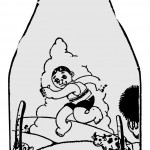11 November 2015
A method to stamp out human sleeping sickness by injecting cattle with a parasite-killing drug and spraying insecticide has proven effective in Uganda.
A research project run by the University of Edinburgh in the United Kingdom reduced cases of acute sleeping sickness among people living in the target area by 90 per cent. But instead of treating people, it sought to eliminate the parasite in cows, which act as a host for the disease and also get a form of sleeping sickness.
The research team, which collaborated with Makerere University in Uganda and the Ugandan government, injected 500,000 cows with a chemical that kills parasites.
In addition, the team regularly sprayed insecticide throughout the field trial to eliminate the parasite’s carrier — the tsetse fly.
“For this neglected disease, treating the infection in cattle, the source of infection to humans, offers us a double whammy: healthier people and healthier animals,” said Sue Welburn, a vice-principal at the University of Edinburgh who led the study. “By turning cows into deadly targets for tsetse flies, sleeping sickness is gradually being pushed out of communities.”
Sleeping sickness comes in both acute and chronic forms, and Uganda is host to both. The disease causes fever and daytime sleepiness, and is often fatal if not treated.
According to the World Health Organization, around 65 million people in Sub-Saharan Africa are at risk from the disease.










